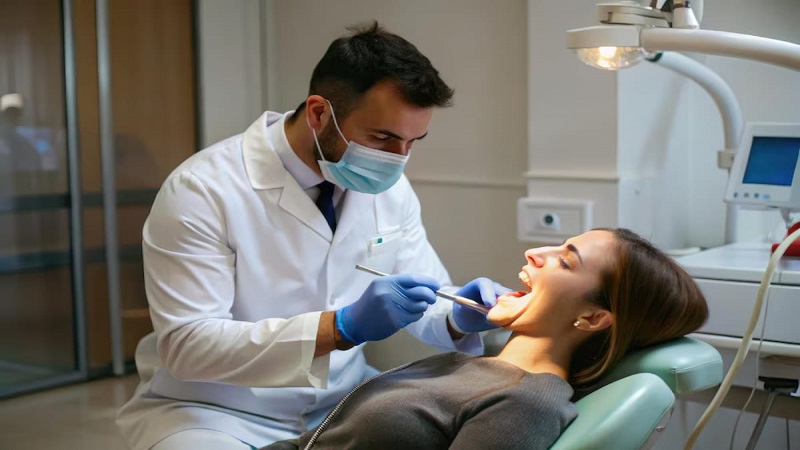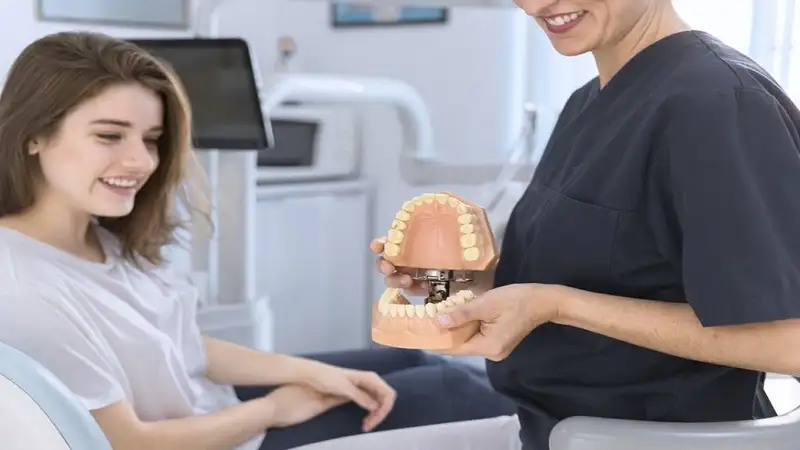When we think about staying healthy, we often focus on eating right, exercising, and visiting the doctor regularly. But did you know that caring for your teeth and gums is just as important for your overall health? It turns out that oral health and body health are closely linked. Problems in your mouth can affect your whole body, and health issues elsewhere can sometimes appear in your mouth. Let’s explore how these connections work and why it’s crucial to prioritize your oral health with your dentist in Red Deer.
How Does Oral Health Affect the Rest of Your Body?
Your mouth contains many bacteria, most of which are harmless. However, without proper oral hygiene, harmful bacteria can grow and lead to gum infections. These infections can spread to other parts of your body, causing more serious health problems.
Here are some of the key ways oral health affects overall health:
- Gum Disease and Heart Disease
Did you know that gum disease can have a significant impact on your heart health? When your gums are infected, bacteria can enter your bloodstream, causing inflammation throughout your body. This inflammation can lead to the buildup of plaque in your arteries, a major risk factor for heart disease, heart attacks, and strokes.
The link between gum disease and heart health is a crucial reason to address gum problems promptly. At their clinic, They offer comprehensive gum treatment for gum disease to protect not just your smile, but also your cardiovascular health. Connect with them today to safeguard your overall well-being!
- Diabetes and Oral Health
Diabetes and oral health have a two-way relationship. If you have diabetes, you are more likely to develop gum disease because your body is less able to fight off infections, including those in your mouth. On the flip side, severe gum disease can make it difficult for people with diabetes to control their blood sugar levels. This creates a vicious cycle where poor oral health worsens diabetes, and uncontrolled diabetes worsens oral health.
- Respiratory Infections
Your mouth is connected to your respiratory system, meaning bacteria can easily travel from your mouth to your lungs. If you have gum disease, the harmful bacteria in your mouth can move to your lungs and lead to serious infections like pneumonia. Additionally, these bacteria can worsen chronic respiratory conditions such as asthma or bronchitis. By maintaining good oral hygiene, you can help prevent these dangerous infections and protect your lung health.
- Pregnancy Complications
Pregnant women need to pay special attention to their oral health. Studies have shown that gum disease during pregnancy can lead to complications such as premature birth or low birth weight.
This is because oral infections trigger inflammation in the body, which can interfere with the baby’s development. Pregnant women should maintain regular dental checkups to avoid complications and ensure a healthy pregnancy.
How Does Overall Health Impact Oral Health?
Just as poor oral health can lead to problems elsewhere in the body, your overall health can impact your mouth and contribute to dental disease. Conditions like diabetes, heart disease, and immune system disorders can directly affect your oral health, increasing the risk of developing dental diseases. Here’s how:
1. Medical Conditions and Oral Health
- Diabetes: As mentioned earlier, diabetes can reduce your body’s ability to fight infections, making it easier for gum disease to develop. High blood sugar levels can also contribute to dry mouth, which increases the risk of cavities.
- Osteoporosis: This condition weakens bones, including the bones in your jaw, which can lead to tooth loss and gum recession. Medications used to treat osteoporosis can also affect your oral health.
- HIV/AIDS: People with weakened immune systems are more susceptible to oral infections, such as thrush, a fungal infection that causes white patches in the mouth, and more severe cases of gum disease.
2. Medications and Oral Health
Many medications, whether for a chronic condition or temporary illness, can have side effects that affect oral health. For example, some medications cause dry mouth, which reduces saliva production.
Since saliva helps wash away food particles and bacteria, a lack of it can lead to cavities and gum disease. Other medications can cause swelling or bleeding gums. It’s important to let your Red Deer dentist know about any medications you’re taking so they can monitor for side effects.
How to Protect Both Oral and Overall Health
The good news is that you can safeguard both your oral health and overall well-being by adopting some simple daily habits. Here’s how to maintain optimal teeth and mouth hygiene—and benefit your entire body:
- Brush and Floss Daily: Brush twice a day and floss once to remove plaque and food particles. This routine helps prevent gum disease and tooth decay, keeping both your mouth and body healthier.
- Maintain a Healthy Diet: A balanced diet is your best ally. Calcium-rich foods, like dairy products, strengthen teeth and bones, while fresh fruits and veggies naturally clean your teeth and boost your immune system.
- Stay Hydrated: Drink plenty of water to keep your mouth moist, wash away harmful bacteria, and promote saliva production, which protects your teeth from decay.
- Visit Your Dentist Regularly: Regular dental checkups are essential for catching problems early, particularly if you have chronic health conditions. The team at their dental clinic in Red Deer provides comprehensive care to manage both your oral and overall health, ensuring that any issues are addressed promptly.
Final Thoughts
Your oral health is more than just a nice smile—it’s a reflection of your overall health. By maintaining good oral hygiene habits, eating a balanced diet, and regularly visiting our Gaetz Dental, you’re not only protecting your teeth and gums but also safeguarding your heart, lungs, and other vital organs. Remember, a healthy mouth is essential for a healthy body! For more information contact our dental clinic near you today.




